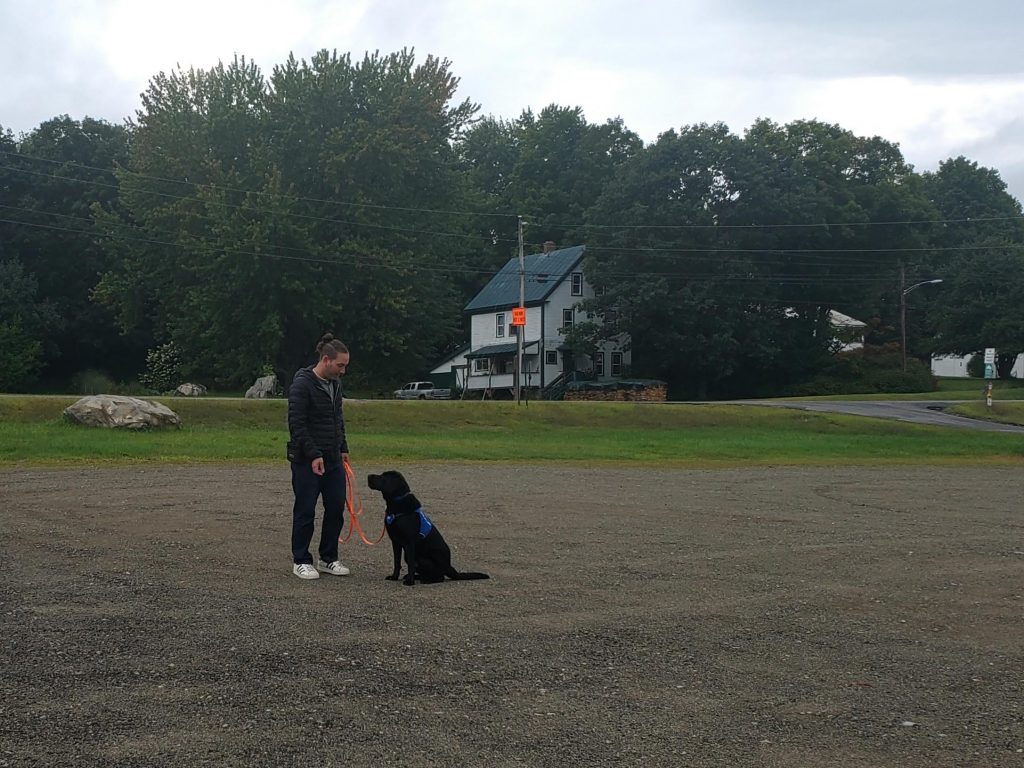
FARMINGTON — Being someone’s eyes is a demanding job for anyone. For guide dogs, the training and experience they receive in their early lives lays the foundation for the tasks they will be asked to perform throughout their career.
The first 12 to 18 months of a guide dog’s life are critical for laying groundwork that allows them to learn the complex tasks necessary for their job. That’s where a puppy raiser comes in.
Josh Cicchino, who raises and trains puppies with Guiding Eyes for the Blind, is looking to start a Western Mountains regional group of puppy raisers. Currently, there are two regional groups in Maine; the northern group generally meets in the Belfast area, and the southern meets in the Portland area.
This new group would allow more people to raise puppies without the need for extensive travel for trainings and meetings.
Guiding Eyes puppy raisers are volunteers who take a guide dog prospect puppy into their home and raise them until they are old enough for more intensive career-specific task training, typically when the pup reaches 14-18 months of age.
Puppy raisers who start a pup at eight weeks are agreeing to a significant time commitment; they’re responsible for new puppy training and ensuring the puppy learns good social skills and house manners. In addition, the puppy will have regular classes for core skills and obedience training. If Cicchino gets enough volunteers to start a new regional group, these classes can be held locally, reducing travel time and expenses.
Between four and six months of age, the pup graduates the foundational classes and moves on to additional training. Puppy raisers aren’t expected to train complex service tasks and guiding skills; that comes later, with specialized trainers and handlers. At this young age, puppy raisers are focused on exposure to different environments, modes of transportation, businesses, and activities. Pups learn to work around distractions and to follow commands from different handlers. They learn things like how to respond to their handler’s body movements and match their handler’s walking pace; to not engage with people, animals, and other distractions while they’re working; to leave treats and food unless given permission. These are foundational skills that are later built on for guiding and service work.
Cicchino is looking for five to eight volunteers interested in raising puppies to start the group off. He is currently talking with the University of Maine at Farmington to see if they can work puppy raising into the rehabilitation services program offered at the college, but is also looking for local families and individuals interested in raising a puppy.
There are pre-placement class requirements for raisers; there’s a minimum of six hours required, but some of the training is available virtually. In addition, there are safety requirements for volunteers to follow, such as removing rodenticide from the property and ensuring the puppy is secure when out-of-doors.
As far as monetary investments, Cicchino said the raiser is responsible for buying food, while Guiding Eyes for the Blind covers the costs of veterinary care, medications and immunizations, and emergency veterinary expenses.
While only one in three prospects makes it all the way to working with a blind person, Cicchino said that the solid training these dogs receive in their early life means that even if a dog doesn’t become a guide dog, they have the potential to have a career as a therapy dog, a psychiatric service dog, a bomb detection dog, or another line of work.
Cicchino will hold a small informal demonstration and meet & greet with his current pup, Sal, at Meetinghouse Park in Farmington Tuesday, September 6, at 5:30 p.m., and will be available to answer questions. Cicchino can also be reached at 207-299-2783 or jcicchino84@gmail.com, and there is more information and applications available at GuidingEyes.org.
Like raising any puppy, raising a guide dog prospect requires time, attention, and commitment. For those who love dogs and are willing to invest their time towards someone else’s future, this can be a great opportunity.




